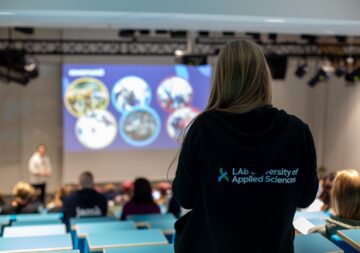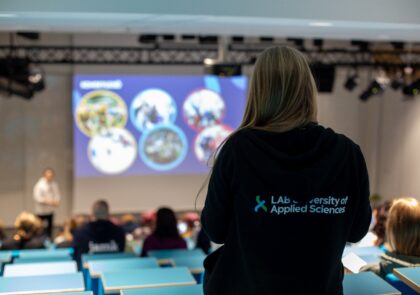
Complex times call for inner strength. We don’t always know what will happen next and plans often need to change. In these times individuals need confidence in their ability to navigate uncertainty. Resilience is about the ability to bounce back when meeting challenges. This article discusses individual resilience from a psychological perspective and key strategies for coping with stress. In any work – office, remote or field work, resilience helps individuals and teams manage stress, stay focused, and keep improving. It helps people to survive and find new ways to succeed.
Authors: Heidi Myyryläinen & Marja Jordberg-Gilabert
Individual´s psychological resilience at work
The work environment is turbulent. Individual resilience can be considered as an ability to cope with stress and adversity and adapt positively (Leonelli & Primavera 2023; Afifi 2018). Some people naturally perform well under stress, while others may struggle in those situations, even though their other abilities suggest they are capable. It’s important to recognize that this response to stress is not a fixed trait, but something that can evolve over time with experience and support. Why can some people overcome adversity whereas others struggle more? The answers to this are far from simple. Anyway, it’s human to find it challenging to stay composed or feel self-assured under pressure. Human responses to stress are individual and shaped by a mix of personality, life experiences, and biology (Rutter 2013). Struggling under pressure isn’t a flaw. It’s a human reaction. However, it seems that people can learn to manage stress. People are not born with resilience or stress management as a fixed trait but can get better at it and develop it over time. It can be learned at any stage of life. Resilience shows how someone deals with fear or challenges, by adapting, and not giving up. This strength comes from within, helping individuals keep moving despite challenges. (Poijula 2018; Allen & Leary 2010)
Resilience, including the ability to manage stress, can be seen as a muscle: the more it’s exercised, the stronger it becomes. It supports navigating life’s ups and downs, recovering from setbacks, and maintaining a positive outlook when plans go awry. Consider a typical remote workday. Something at work does not go the way it should. These situations bring stress. Studies show that resilience helps managing stress indirectly and directly (Leonelli & Primavera 2023). Instead of being overwhelmed by frustration, the focus shifts to what can be done. A flexible mind can break problems down into steps, set priorities and adjust. This way stress can begin to feel more manageable.
To some extent stressors are an inevitable part of work. A major aspect of resilience is the belief in one’s ability to influence outcomes, a sense of agency and control. To improve resilience, individuals can work on building their sense of agency through small, achievable actions that increase their sense of control. For example, managing daily tasks, setting clear personal goals, and taking active steps in managing emotions (such as practicing self-care, seeking feedback, or improving skills) can empower individuals to feel more capable of handling stress and challenges. The more control a person feels they have, the more resilient they become in the face of adversity. (Rutter 2013)
Laura, a remote project manager for an engineering firm, learns that a critical piece of equipment has failed on-site, risking a delay in a crucial infrastructure project. Understanding the stakes, she quickly coordinates with the team through a video call. She explains the issue, delegates tasks, and uses their project management tools to adjust the timeline. Thanks to the team’s ability to act and collaborate well, the equipment is repaired soon. This example illustrates how remote teams can tackle challenges when they are alert and well connected.
Ultimately, managing stress and building resilience is a continuous learning process (Rutter 2013). It involves meeting challenges with openness and spotting opportunities for positive change too. Emotional awareness is key in remote work, helping us recognize stress and respond in healthy ways. Small, everyday moments in remote work, like overcoming obstacles, small, smart adjustments, or managing stress, gradually build the capacity to handle future challenges more effectively. With experience confidence and ability to adapt in handling remote challenges grows. As a result, the next challenge feels more manageable.
Strategies for coping with stress – self-compassion helps
To strengthen resilience, it’s essential to develop effective strategies for handling stress and pressure as they arise. Problem-solving is a coping strategy that helps address challenges by planning and acting. Again, self-compassion can equip individuals with emotional resources to cope with external challenges. When individuals feel empowered to change a situation, self-compassion may encourage them to take constructive actions. On the other hand, when the individual feels powerless, it may provide comfort without necessarily leading to problem-solving efforts. If the problem is such that individual can´t change, then internal coping strategies work better. (Allen & Leary 2010)
One of the coping mechanisms is positive cognitive restructuring. It involves changing the way the individual thinks about stress. Accepting it reduces negative consequences. In this, self-compassion plays a key role in this process because when individuals with higher self-compassion tend to view negative events more calmly. Studies show that interventions that promote self-compassion help reduce stress, self-criticism and negative emotions. (Allen & Leary 2010)
Can dealing with stress be supported remotely?
Something to keep in mind is that sense of resilience is a holistic matter that has psychological and social dimension (Rutter 2013). Individuals can practice resilience in many ways in remote work or remote studies. Ability to learn new things, self-empathy and social support are important remotely too. Remote workers can seek ways to build resilience and manage stress effectively. For example, one can set clear boundaries between work and personal time to try to maintain balance. Another way is to take regular breaks to recharge, whether it’s a short walk, stretching, or mindfulness practice. Staying connected with colleagues ensures good communication on important and timely topics.
Being able to reflect and adapt can be helped. Resilience grows stronger when we don´t have to carry things alone. Studies have also shown that guided, internet-based stress management interventions can effectively reduce work-related stress and improve mental health outcomes. Perceived support is important and can be delivered remotely too. (Persson Asplund et al. 2018) Resilience thrives in environments where there´s self-care and some support in any work settings.
References
Afifi, T.D. 2018. Individual/relational resilience. Journal of Applied Communication Research. Vol. 46 (1), 5-9. Cited 5 April 2025. Available at https://doi.org/10.1080/00909882.2018.1426707
Allen, A.B. & Leary, M.R. 2010. Self-compassion, stress, and coping. Social and Personality Psychology Compass. Vol. 4 (2), 107–118. Cited 5 April 2025. Available at https://doi.org/10.1111/j.1751-9004.2009.00246.x
Hartmann, S., Weiss, M., Newman, A. & Hoegl, M. 2020. Resilience in the workplace: A multilevel review and synthesis. Applied Psychology. Vol. 69 (3), 913–959. Cited 5 April 2025. Available at: https://doi.org/10.1111/apps.12191
Leonelli, S. & Primavera, E. 2023. Coping with stress: The importance of individual resilience and work tasks complexity and unpredictability. In: Marques, J. (ed.) The Palgrave Handbook of Fulfillment, Wellness, and Personal Growth at Work. Cham: Palgrave Macmillan. Cited 5 April 2025. Available at https://doi.org/10.1007/978-3-031-35494-6_14
Persson Asplund, R., Dagöö, J., Fjellström, I., Niemi, L., Hansson, K., Zeraati, F., Ziuzina, M., Geraedts, A., Ljótsson, B., Carlbring, P. & Andersson, G. 2018. Internet-based stress management for distressed managers: Results from a randomised controlled trial. Occupational and Environmental Medicine. Vol. 75 (2), 105–113. Cited 5 April 2025. Available at https://doi.org/10.1136/oemed-2017-104458
Poijula, S. 2018. Resilienssi – Muutosten kohtaamisen taito. Helsinki: Kirjapaja.
Rutter, M. 2013. Annual Research Review: Resilience – Clinical implications. Journal of Child Psychology and Psychiatry. Vol. 54 (4), 474–487. Cited 5 April 2025. Available at https://doi.org/10.1111/j.1469-7610.2012.02615.x
Authors
Heidi Myyryläinen is a RDI Specialist at LAB University of Applied Sciences.
Marja Jordberg-Gilabert is a Senior Lecturer at LAB University of Applied Sciences.
Authors work in Distance LAB – remote service hub for SME’s and public sector -project that boosts remote innovation, hybrid strategies, and sustainability at remote work and business.
Illustration: https://pxhere.com/fi/photo/722471 (CC0)
Reference to this article
Myyryläinen, H. & Jordberg-Gilabert, M. 2025. Building resilience at work. LAB Pro. Cited and date of citation. Available at https://www.labopen.fi/en/lab-pro/building-resilience-at-work/






